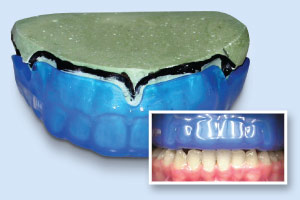Mouthguards
Properly fitted and used, they protect your child's teeth during contact sports
Dear Doctor,
I am an athletic coach and really liked the Dear Doctor consultation on accidental tooth loss — I know so many kids who have damaged their front teeth during sports. What do you think of mouthguards for protection against injury?

It is generally recommended to use a dentist fabricated custom made mouthguard during any activity that could result in a blow to the face or mouth. Fractured, broken and dislodged teeth can be extremely painful and expensive to fix or replace, aside from the anxiety and discomfort caused by injury. An ounce of prevention is worth a pound of cure.
A properly fitted custom made mouthguard can help prevent broken teeth and injuries to the lips, tongue, or jaw. It will stay in place while you are wearing it, making it easy for you to talk and breathe.
There are three types of mouthguards: the stock guard where there is no attempt at fit; the mouth-formed “boil-and-bite,” which offers a poor fit; and the custom mouthguard made by a dentist which has the best fit because it is made from a mold of your mouth. They are designed to help buffer an impact or blow that otherwise could cause broken teeth, jaw injuries or injuries to the soft tissues (gums, lips or tongue). Mouthguards are used most commonly in contact sports, such as boxing, football, hockey and lacrosse. Other sports where mouthguards are recommended are basketball, soccer, water polo and rugby.
A properly fitted custom made mouthguard can help prevent broken teeth and injuries to the lips, tongue, or jaw.
You should choose a custom mouthguard that is resilient and tear-resistant, fits properly and is comfortable, easy to clean, and does not restrict speech or breathing. The medical/dental literature states that store bought stock or boil and bite mouthguards do not offer the same protection as a custom made mouthguard. Dr. Andrew Greasley in 1998, in the British Journal of Sports Medicine reported that “the boil and bite mouthguard afforded only slightly more protection than no mouthguard at all.” In 1993 Dr. Park reported at the 1st International Symposium of Biomaterials that “Unless dramatic improvements are made, boil and bite mouthguards should not be promoted to patients.”
 |
| (Left) Custom mouthguard created from mold of patient's teeth. (Right) Custom mouthguard worn by child. Notice all of the lower teeth hit appliance. |
| Photos provided by Dr. Ray Padilla |
Patients need to take care of their dentist fabricated custom made mouthguards by doing the following:
- Rinse before and after each use, or brush with a toothbrush and toothpaste;
- Occasionally clean the mouthguard in cold, soapy water and rinse thoroughly;
- Transport the mouthguard in a sturdy vented container;
- Don't leave the mouthguard in the sun, in hot water, or in any hot environment;
- Regularly check for wear, see your dentist and replace the mouthguard when necessary.
Ask your dentist if he or she can make a custom mouthguard for you or your child. It should fit more comfortably than a retail version, and offers the best protection for your smile.




